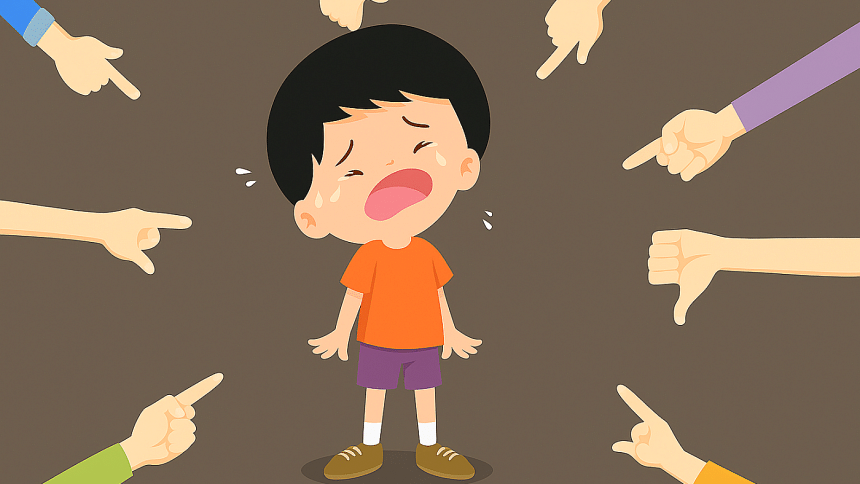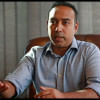How body shaming affects kids and what families should do

A child comes home in tears. It was not a bully on the street but a relative who laughed and said, "You've become such a roshogolla!" Everyone chuckled. The child did not.
In many Bangladeshi households, comments about a child's body are made casually, often with laughter, sometimes with "good intentions". However, the damage often runs deep, and it starts early. Body shaming is not just a teenage problem; it begins in childhood, and often from the people children trust the most.
What is body shaming, really?
According to Professor Dr Helal Uddin Ahmed, a specialist in Child, Adolescent, and Family Psychiatry at Faridpur Medical College, body shaming refers to any negative or critical comment made about someone's physical appearance, whether it's about body shape, facial features, skin tone, height, or weight.
"This includes direct insults, sarcastic remarks, or even subtle jokes that the person can understand," Dr Ahmed says. "And it does not always come from people — it can come from media, movies, advertising, even lyrics in songs."
The hidden toll on children
For adults, a mocking comment might sting. For a child, it can quietly shape how they see themselves in life.
"Children and adolescents are in a crucial developmental phase," Dr Ahmed explains. "That's why body shaming can have both immediate and long-term effects."
Short-term, it often leads to low self-esteem, social withdrawal, anxiety, and even depression. A child who's teased for being "too fat" or "too dark" might begin hiding from others, avoiding group activities, or becoming unusually quiet at home.
But the damage does not stop there. "One major concern is the development of eating disorders," he warns. "Children may overeat in secret, or develop patterns like bulimia, where they eat and then force themselves to vomit because they have been told they are gaining weight."
As this cycle continues, children's physical health can also be compromised, leading to serious long-term consequences that many families fail to connect back to the original harm.
"It Made Me Feel Distant from Everyone"
Anonymously, one person shared with us what it felt like to be body-shamed as a child. "In primary school, children used to call me fat. Yeah, I felt very sad, depressed... distant from everyone in the class."
The bullying mostly came from "friends, sort of," they added, explaining that the emotional effect still lingers. "These days, whenever people joke around, I kind of feel weak and alone… low in confidence."
When asked if they tried to change their body to escape the comments, the answer was immediate: "Still trying. But it's quite difficult."
Their message to others is clear: "It's not cool. Doing it once in a while might slip by… but always? No. Just stop."
Similarly, Shuvo, 19, says a school coach once laughed and said, "Tomake to hawa uray niya jabe," because of his thin frame. "I was humiliated in front of everyone. I stopped playing cricket after that."
These seemingly minor jabs often act like slow poison, eroding a child's sense of belonging and joy.
Parents: The first line of defence
Dr Ahmed emphasises the importance of parental support, stating, "Parental support begins with protection."
Parents should shield their children from body shaming, even from well-meaning relatives, and it's essential not only to tell them to 'ignore it" but also to validate their feelings and create a safe, non-judgmental home.
He advises against dismissive comments like "just lose some weight" or "don't take it seriously." Instead, parents should foster a positive body image by teaching acceptance and respect for oneself. If health concerns arise, families should promote healthy habits like balanced eating and active play, ensuring the child does not feel targeted for their appearance.
No, it's not 'motivational'
In many Bangladeshi households, adults still believe that saying "you've gained weight" or "you're too skinny" is helpful. Dr Ahmed challenges that directly.
"My advice is simple: body shaming is never helpful. It's always harmful," he says. "There's scientific evidence that this kind of language doesn't motivate; it actually damages self-worth."
He urges adults to rethink what they call "motivational cruelty" and instead focus on respectful, encouraging dialogue. "If someone in the family keeps making body-shaming remarks, others need to step in. The silence of bystanders reinforces the harm."
Body shame grows in silence and casual cruelty. But it can be stopped with care and awareness.
Children should not grow up believing their worth depends on a number on the scale or a comment from an uncle. They should grow up free to run, eat, laugh, and exist without shame.
If the harm begins with words, the healing must begin there, too.

 For all latest news, follow The Daily Star's Google News channel.
For all latest news, follow The Daily Star's Google News channel. 








Comments